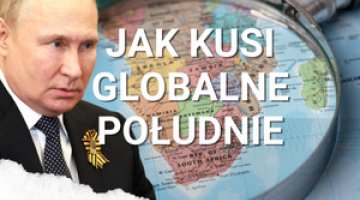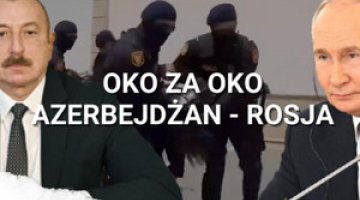Moscow’s neo-imperialist plan: Medvedev unveils the Kremlin’s strategic goals
On 4 March, during the World Youth Festival near Sochi, Deputy Chairman of the Security Council of the Russian Federation and Chairman of the ruling United Russia party Dmitry Medvedev presented the Kremlin’s strategic goals on the Eurasian continent in the situation of Russia’s war with Ukraine and its conflict with the West. As regards Ukraine, one such goal is the capitulation of its ‘Nazi’ leadership. In his words, ending the war will only be possible when a new government emerges in Kyiv which would be ready to accept and recognise Russia’s annexations of Ukrainian territory.
Medvedev remained vague about the scope of Russia’s territorial claims towards Ukraine. On one hand, he hinted that the Ukrainian state should be dismantled completely, commenting that its very existence was “fatal” to the country’s population and that “Ukraine is definitely Russia”. On the other hand, he ‘limited’ Russia’s claims to Ukraine’s southern and eastern regions. He illustrated his point with a map showing Russia stretching across Ukraine’s entire Black Sea coast all the way to the borders with Romania and Moldova (‘Novorossiya’) and across Chernihiv and Kharkiv oblasts located east of the Dnipro river (‘Malorossiya’), as well as Cherkasy oblast, which is located west of the Dnipro river.
Medvedev also suggested that rising powers should, due to their need to ensure their own security, have the right to spheres of influence (“strategic borders”) which go beyond their official state borders (“geographical borders”) but at the same time may be narrower than their “civilisational borders”.
As regards Russia, he claimed that its “strategic borders” reach all the way to the Carpathian Mountains, the mountains of the Caucasus, the uplands of Iran and the Pamir Mountains, and encompass the entire continental shelf in the Arctic. In his view the states located within the area delimited by these boundaries form a “natural belt of strategic security” and “the core of our strategic space”. Those states must be ruled by regimes which guarantee internal stability and are politically loyal to Moscow (“sovereign”, which in Kremlin-speak means those which do not pursue a pro-Western policy). He pointed to the Union State of Russia and Belarus as a model for Russia’s relations with its neighbours.
Medvedev also mentioned Russia’s project regarding Eurasia, that is the ‘Great Eurasian Partnership’ which Vladimir Putin announced back in 2015. However, he limited himself to vague generalities when describing the project (cooperation to foster economic development and welfare, the development of trade etc.).
Accusations against the United States were another important element of Medvedev’s speech. According to him, the US has created the risk of a nuclear war by allegedly becoming directly involved in the war against Russia in Ukraine, by providing Ukraine with supplies of armaments and by allegedly sending special forces and advisors there. Medvedev assessed the risk of a nuclear conflict as “a hundred times higher” than during the Cuban missile crisis back in 1962.
Commentary
- Although the West takes Medvedev’s frequent radical statements ever less seriously, both the context of his recent speech (an official lecture to an international audience) and its content, which bears the hallmarks of a programme based on a comprehensive concept, suggest that it was an element of the Kremlin’s information policy and reflected a strategic vision shared by the Putin regime. On one hand, it was an expression of the conviction that Russia is just one step away from victory in Ukraine and can, from a position of power, negotiate both the terms of Kyiv’s capitulation as well as the details of a future European security architecture endorsed by the Kremlin (based on the recognition of Russia’s sphere of influence in the post-Soviet area). On the other hand, it was an element of Russia’s psychological warfare against the West, trying to persuade it to launch talks with Moscow by raising the spectre of escalation, in particular including the outbreak of a nuclear conflict.
- Medvedev’s rhetoric suggests that Putin and his aides are increasingly self-confident. Russia’s aspirations as he presented them involve not only the de facto elimination of Ukrainian statehood, but also the intention to treat all post-Soviet states as Russia’s satellites, stripped of their status as independent subjects. This is implicit in his praise for the Belarusian-Russian relationship, in which Minsk has been almost fully stripped of its agency in the strategic-political sphere, and made economically dependent on Russia. However, the Kremlin’s ambitions go beyond the demand for the West to recognise Russia’s hegemony in the post-Soviet area. Moscow is also effectively seeking to dismantle the present security order in Europe, as transpires from Russian documents forwarded to NATO and the United States in December 2021 (see ‘Russia’s blackmail of the West’). Although the views presented by Medvedev have long been present in Russia’s intellectual and political discourse, they had hitherto never been articulated by a top-level official in such an open and comprehensive manner.
- This presentation of the Kremlin’s neo-imperialist goals will continue to breed suspicion and concern among both the publics and elites of the post-Soviet states regarding the consequences of Russia’s potential victory in its war against Ukraine. It may also encourage at least some of them to intensify their attempts to distance themselves from Moscow and its conflict with Ukraine and the West. Excessive self-confidence on the part of the Kremlin elite and its conviction of Russia’s imminent victory will prompt it to pursue these maximum goals regarding Ukraine and the West both politically (the proposal to launch talks) and militarily (particularly as part of the offensive in Ukraine).





